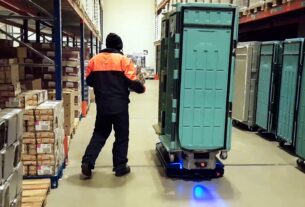As the Coronavirus creates turmoil in our daily lives, businesses are moving quickly to respond to a radical shift in consumer behaviour. A boom in online orders, likely to become a feature of the ‘new reality’, is triggering a major re-think of the fulfilment operation. Here are five key factors influencing a drive for agile fulfilment. By Frazer Watson, Head of Sales for Hikrobot at Invar Systems.
1. Operational resilience and responsiveness – Nothing could have prepared the corporate world for the shock of a global lockdown, but moving forward the
We will be a desire to create supply chains with greater resilience and agility, and this will extend into the fulfilment process.
Research carried out by International Data Corporation (IDC) on behalf of Kinaxis in May 2020 finds that supply chain resilience and agility are the biggest priorities for nearly half (48%) of organisations over the next 12 months, with the next top priority being operational efficiency (46%).
Critically, organisations are uncertain about the future demands on the business and what changes may be required within the fulfilment operation. Will there be more promotional activity, resulting in sharper peaks? Or could there be longer, extended peak periods, with a greater number of returns? Will new forms of packaging be required? Could product profiles shift, SKUs radically expand – and how might new, spontaneous marketing initiatives impact operational processes?
There are many unknowns. So if ecommerce businesses are to minimise risk and respond quickly to change, greater operational agility will be required to provide the responsiveness that customers expect – and the resilience logistics practitioners are looking for.
Meeting such a significant rise in demand for online orders will, take automation. The automation applied will have to be highly flexible, readily scaleable and capable of delivering the speed, accuracy and performance demanded.
2. Labour availability and social distancing – The traditional, manual, approach to order picking has in recent times been significantly challenged by three key factors.
Following Brexit, available labour resources are no longer as easy to access in many areas of the country. The National Living Wage, applicable to all employees over 25 years old, has risen to £8.72. With COVID-19, social distancing requirements within the warehouse present a major challenge for organisations.
Flexible automation using goods-to-person technology offers an attractive alternative to manual picking. Autonomous Mobile Robots (AMRs) allow valuable human resources to be reallocated to alternative, more skilled tasks.
Continue reading for free HERE…


